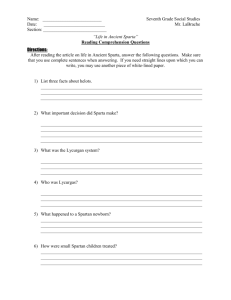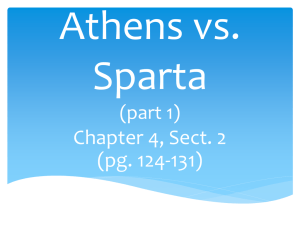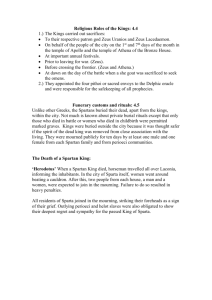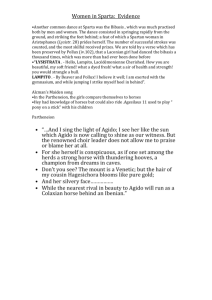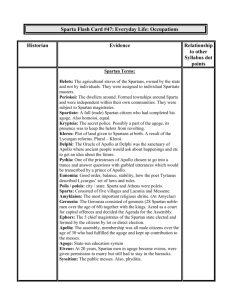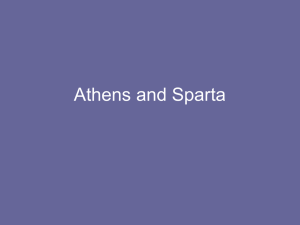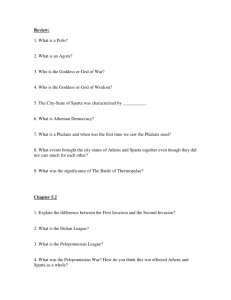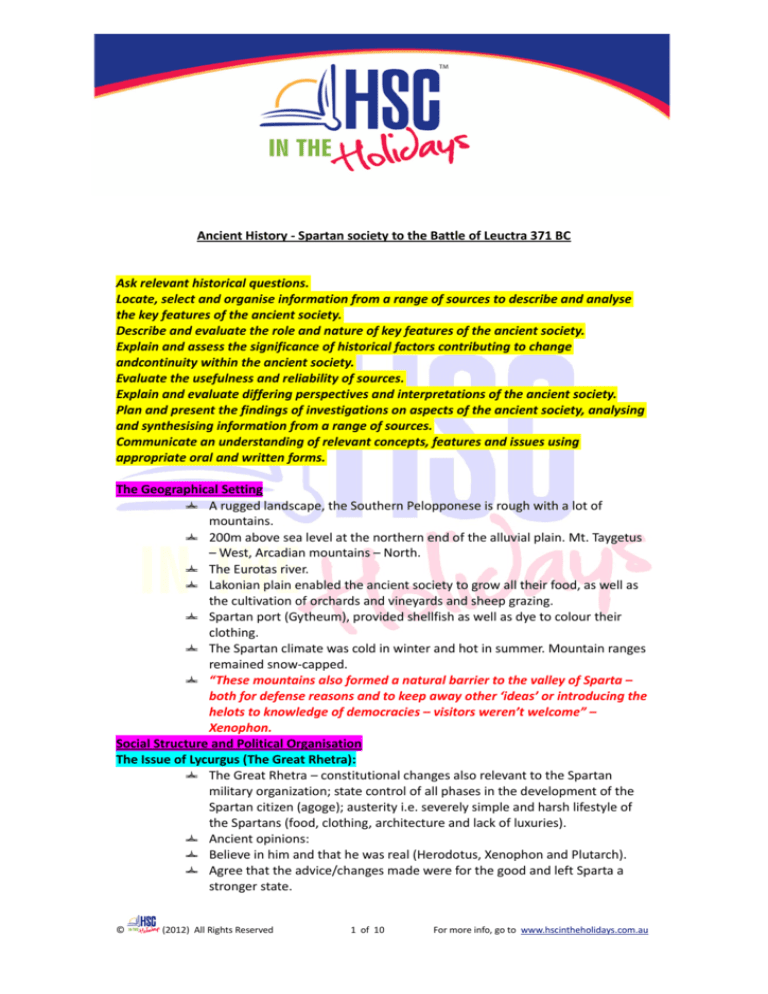
Ancient History - Spartan society to the Battle of Leuctra 371 BC
Ask relevant historical questions.
Locate, select and organise information from a range of sources to describe and analyse
the key features of the ancient society.
Describe and evaluate the role and nature of key features of the ancient society.
Explain and assess the significance of historical factors contributing to change
andcontinuity within the ancient society.
Evaluate the usefulness and reliability of sources.
Explain and evaluate differing perspectives and interpretations of the ancient society.
Plan and present the findings of investigations on aspects of the ancient society, analysing
and synthesising information from a range of sources.
Communicate an understanding of relevant concepts, features and issues using
appropriate oral and written forms.
The Geographical Setting
A rugged landscape, the Southern Pelopponese is rough with a lot of
mountains.
200m above sea level at the northern end of the alluvial plain. Mt. Taygetus
– West, Arcadian mountains – North.
The Eurotas river.
Lakonian plain enabled the ancient society to grow all their food, as well as
the cultivation of orchards and vineyards and sheep grazing.
Spartan port (Gytheum), provided shellfish as well as dye to colour their
clothing.
The Spartan climate was cold in winter and hot in summer. Mountain ranges
remained snow-capped.
“These mountains also formed a natural barrier to the valley of Sparta –
both for defense reasons and to keep away other ‘ideas’ or introducing the
helots to knowledge of democracies – visitors weren’t welcome” –
Xenophon.
Social Structure and Political Organisation
The Issue of Lycurgus (The Great Rhetra):
The Great Rhetra – constitutional changes also relevant to the Spartan
military organization; state control of all phases in the development of the
Spartan citizen (agoge); austerity i.e. severely simple and harsh lifestyle of
the Spartans (food, clothing, architecture and lack of luxuries).
Ancient opinions:
Believe in him and that he was real (Herodotus, Xenophon and Plutarch).
Agree that the advice/changes made were for the good and left Sparta a
stronger state.
©
(2012) All Rights Reserved
1 of 10
For more info, go to www.hscintheholidays.com.au
“By these changes, Spartan government was put on a sound basis…” –
Herodotus.
Modern opinions:
Doubtful and skeptical.
“The very existence of Lycurgus if open to doubt…” – Michell.
However:
“The balance of probability is on the side of Lycurgus actually living &
done his work for the benefit of Sparta.” – Michell
Roles and Privileges of the Two Kings:
Government:
Ephorate continued:
Foreign relations – dealt with embassies; foreign representatives/envoys had
to ‘report’ to the ephors for entry or any proposals; issued orders mobilizing
the army; gave instructions to generals.
Controlled training and discipline of young: any misconduct was reported.
Legal & Political responsibilities – summoned & presided over sessions of
gerousia & assembly – initiated legislation; acted as a court of criminal
justice with the gerousia and carried out punishments.
©
(2012) All Rights Reserved
2 of 10
For more info, go to
www.hscintheholidays.com.au
Social Structure:
Role of the Spartan Army:
• Organisation:
− 6 Battailons (1000 each) subdivided.
− King – commander.
− Each battalion had polemarchs (high ranking).
Junior officer controlled smaller units under polemarchs.
“When an emergency arose all those capable of bearing arms gathered
and went to battle under the command of chieftains and the kings.” –
Michell
Armour & Equipment:
Heavily armed infantrymen – main defence mechanism (spear, hoplon and
bronze/iron helmets).
Body armour and particularly upper body protection.
Phalanx Warfare:
Big blocks of several thousand men challenging opposition & breaking their
formation while keeping their own.
Stresses teamwork, physical & mental strength.
Spartans best system including the ability to re-form if broken.
©
(2012) All Rights Reserved
3 of 10
For more info, go to www.hscintheholidays.com.au
The Spartan Hoplite (sources – Herodotus):
Dedicated to fighting for their country, no matter the cost.
Numbers were not even an overcoming obstacle to their cause.
“…they will fight you even if the rest of Greece submits…” – Herodotus.
Fought as a team no matter the number of players.
“…suppose a thousand of tem take to the field- then that thousand will
fight you; and so will any number, greater than this or less.” – Herodotus.
Ultimately free as people of higher positions socially but they are:
“…not entirely free; for they have a master, and that master is Law, which
they fear much more than your subjects fear you.” – Herodotus.
Bound to the law which they lived by and did not give in to fear – because
the ‘fear’ they held of The Great Rhetra was much stronger.
Ultimate warriors with no confessed fears towards enemies of any number
or strength.
Their training had ensured that they could withstand the worst possible
outcome and because of the abiding law of The Great Rhetra, they were
willing to become martyrs for their society.
Had pride and honour much larger than any number of soldiers could take
on.
Other Groups:
Perioeci used especially as Spartiates declined in numbers.
“the ranks had to be filled with perioeci, who were no longer brigded
separately but served in the same battalions as the Spartans.” – Michell.
Helots used as ‘skirmishes’ – throwing spears stones etc.
Pythioi (priests) taken to read entrails etc.
Code of behaviour: loyalty/obedience – king’s word is law.
Control of the Helots:
The Syssitia:
Plutarch – messes were created deliberately to avoid gluttony.
16 members in each mess (fitted the fact that each phalanx held 8 men).
Code of secrecy: “Whatever’s said in here, stays in here.”
Admittance of new members had to pass through the ‘audition’. They’d be
cast/voted out with only one was against.
To maintain membership each member made contributions and met
obligations.
Shirkers were those who were stripped of their citizenship since they could
not provide/contribute.
Non-attendance was unacceptable unless reasons included hunting, illness
or religious festivities
Importance: allowed men to create strong bonds and ultimately stick
together in battle; helped to maintain eunomia helped to re-inforce
standards –i.e. taught the effects of drunkenness and also receiving
constructive criticism from the older men.
The Krypteia:
Sparta’s secret police force – translates to ‘the secret business’.
Group selected at end of agoge training – picked by ephors.
Qualities were brutality + ability to kill people.
Operated undercover + at night.
Role was to terrorize helots – psychological attack.
Technically part of the agoge – last test a Spartan could go through.
Educational System – Agoge:
©
(2012) All Rights Reserved
4 of 10
For more info, go to
www.hscintheholidays.com.au
Supervision & Discipline:
Experienced harsh discipline and training throughout their lives.
Under the guardianship of a paidonomos – acted as a public guardian and
©
enforced discipline (citizens also had the right to enforce discipline if
guardian was absent).
Obedience enforced by older boys, often with whips.
“The same system that sought to toughen them physically was used to
harden them intellectually. If they failed to give sensible replies, they were
ridiculed and punished, rather curiously, by having their thumbs bitten by
the eiren.” – Michell.
Physical skills and hardships – high pain threshold:
Strength, courage, bravery and endurance enforced by training barefoot and
often naked.
Willingness to do anything/kill without compassion.
Stealth and secrecy as the boys were often forced to sneak out to get food. If
caught, they were punished for:
“being a sorry burglar in the art.” – Michell
Taught to be silent and gaze at the ground when in public – mateship
enforced by the syssitia and the constant companionship with their
comrades.
Encouraged to:
Fight each other to avoid developing bonds between two people.
Take own straw/marsh from beside the lake as bedding each night.
Bathe in a freezing lake.
Opportunities for involvement:
Paidonomous – only Spartans of great reputation; runs day-to-day Agoge
training and supervision; hands on experience; chosen out of the most
respected/highly regarded Spartiates (40’s); veteran of many battles.
(2012) All Rights Reserved
5 of 10
For more info, go to www.hscintheholidays.com.au
Eirens (cadet) – 18yrs; supervision of smaller groups of boys outstanding of
their group; capacity to handle it; born commanders/leaders; disciplinarians
who inflict pain; watched by the paidonomous and were accountable of their
actions; being trained in the process (multi-skilling).
Captain of eirens – further recognition (best of eirens); judged as eirens and
then promoted; could eventually end up in the 300 corps of knights who
acted as the kings’ bodyguard.
Corps of knights (huge honour) – 24yrs and 300 in group; protected the kings
in battle (frontline and phalanx) and fought with the king.
Krypteia (secret business) – 18-23yrs; nearly finished training and were hand
picked to be brutal (sadists) who stealthily and sneakily instilled terror in the
community – it was mostly a psychological terror factor.
Role and Status of Women:
Daily Lives:
Women kept fit by running, throwing javelins and the discus.
Had huge responsibilities as men were often away so they were well
©
respected.
Exercise regime ensured that:
“…their children in embryo would make a strong start in strong bodies and
would develop better.”
Women were required to undertake the same amount of exercise as the
males.
‘Bibasis’ – exercise to strengthen legs, torso etc.
Forbidden to wear anything other than their basic ‘slit skirt’ as it was
practical dress for exercise.
Encouraged to exercise in the nude – takes away any mystery or curiosity
about the opposite sex and therefore no romance:
“He made young girls no less than young men grow used to walking nude
in processions as well as to dancing and singing at certain festivals with
the young men present and looking on.”
Roles at Festivals & Processions:
Participated in religious festivals – singing, dancing etc.
Wrote songs about the males – praise or criticism - impacted on the males’
reputation
Marriage Rituals:
Married slightly later when in their ‘prime’ ensuring their physical fitness .
(2012) All Rights Reserved
6 of 10
For more info, go to
www.hscintheholidays.com.au
‘Husband’ turned up at the darkened room after the girl is ‘prepared’ by the
bridesmaid.
No papers or symbols, the marriage is just publicly acclaimed and really no
strings attached apart from childbirth.
Relationships between older (30yrs) men and younger men – encouraged;
meant that the older man provided the younger with a mentor.
Marriage continues but partners did not live together (husband sneaks
around to encourage stealth – similar to young boys encouraged to steal
without getting caught).
Men still ate at the messes after 24 years old to keep the military bond.
Spartan men were open to ‘wife-sharing’ with ‘well-bred’ other men so as to
produce great children:
“Planting in fruitful soil.”
Childbirth Customs:
Ultimate test of courage for women just as men for battle:
“The challenge of childbirth…” – Plutarch.
No crying or uttering of pain – elderly women were there to assist but also
keep them in line:
“Successful, relaxed way…” – Plutarch.
Signs of weakness in the mother meant weakness in the child.
Land Ownership/Inheritance:
Heiresses were numerous at Sparta.
Two-Fifths of land was in the hands of women.
Keeping the property within a family through marriage was accepted.
Overall Comments:
Women were very highly respected as they bore the Spartan children.
Exercised and trained just as the men did, also taught harshly and to act out
strictly towards their sons. No sense of pity, compassion or weakness.
Held strong beliefs in keeping the military Sparta without cowardice –
examples:
Damatria who killed her son after hearing of his cowardly acts.
Another Spartan woman verbally disowning her son, claiming:
“He’s not my offspring.” – Plutarch.
Played a huge role in keeping the men ‘strong’ and ‘masculine’ without
cowardice or signs of weakness; judged the males through songs at the
festivals.
Accepted loss of males and even supported their deaths.
“Son, either with this or on this.” – Plutarch.
Religion, Death & Burial
Links between religion and eunomia:
The gods had a hierarchy and the Spartans paralleled this as well.
The Spartans took religion more seriously than any other Greek state as they
had more to lose if balance of society or eunomia was upset.
Festivals:
©
(2012) All Rights Reserved
7 of 10
For more info, go to www.hscintheholidays.com.au
Important Sites:
The Sanctuary of Amyclae:
Marked by a temple dedicated to Apollo.
Held a most valuable and sacred statue of Apollo – statue carrying spear
showed Sparta’s sole purpose was militaristic
The Temple of Artemis Orthia:
On the banks of the Eurotas River just outside of Sparta.
‘stealing of the cheeses’ conducted here.
Artemis was goddess of fertility
Archaeologists have found small gifts as offerings most likely from Spartan
women who needed help in falling pregnant and bearing healthy boys
Gods & Godesses:
Worship of deities:
Poseidon:
Temple at the coast of Laconia (god of the sea).
Demeter:
Shrine dedicated in Laconia, she was a goddess of agriculture and fertility
(nature)
Zeus:
Father of the gods – both Spartan Kings were thought to be priests of Zeus
and conducted ceremonies to keep the belief/ritual dedicated to Zeus
Worship of fear:
Recognized fear as a powerful force which could strip courage – they
therefore paid respect to it and sought to conquer it.
At the heart of it was their fear for the helots, not living up to standards and
letting their state down.
Religious Role of the Kings:
Two kings – chief priests.
Ephors – acted at religious festivals.
Some members of the Gerousia – also acted in some religious matters.
©
(2012) All Rights Reserved
8 of 10
For more info, go to
www.hscintheholidays.com.au
Assistants of the kings – the ‘pythoi’ were priests attached to the kings e.g.
cutting the goat and reading entrails. They were also messengers to Delphi
to get words of the gods.
Funerary Customs & Rituals:
Burial was marked only if one died in the service of Sparta – a
marked/named headstone was highly prestigious as one’s name would be
remembered.
Elaborate funerals for kings where whole society would go through a period
of mourning for 10 days including fasting.
Heroes who died for Sparta were given elaborate treatments e.g. King
Leonidas was erected a statue and his 300 men. The stone was marked in
recognition of allowing their memory to live on as they died for Sparta and
ultimately according to the laws.
Myths & Legends:
Lycurgus was a historical figure turned into a god and worshipped.
Menaleus and Helen also were adopted – Helen was beautiful, Menaleus
prepared to start war for what was rightfully his.
The Heavenly Twins (Dioscuri) – Castor and Pollux:
According to Greek mythology, only one could be mortal/immortal.
Therefore, they’d take it in turns everyday, symbolizing the ‘sharing’,
‘equality’ and ‘sacrifice’ in brotherhood i.e. homoioi .
They also apparently never fought – hence, kept the reservation of eunomia.
Temple also in Laconia.
Cultural Life
Art:
Famous for their pottery (early periods).
“Laconian Pottery” – main scenes included hunting, religious festivals, horse
riding and nature. Reflected the pre-military Sparta.
Were found overseas - shows that they traded and had artists.
All art and pottery which was adorned is banished post-Lycurgus.
Architecture:
Not rich in architectural but remnants of temples such as the Parthenon
exist.
Did not see great significance in architecture.
Amyklion – temple (Amyclae) dedicated to Apollo.
Artemis Orthia – very simple and plain without columns.
Temple of Athena – destroyed but Pausanius (Greek writer) describes it as
having two great bronze doors, a reminder that they worked in metal etc.
Menalion – ancient temple dedicated to Menelaeus and Helen in the Trojan
War. The temple design is in the form of a step pyramid.
Writing & Literature:
Alkman (pre-Lycurgun poet):
“…there is vengeance from the gods, but happy is the man who weaves the
©
fabric of his days with peace, and without tears.”
“Aphrodite commands, and love rains upon my body and melts my heart.”
“She wears a gold chain of slender petals of purple flowers.”
“The calm sea falls dumbly on the shore among a tangle of seaweed.”
Ultimately shows contrast between pre-military Sparta and post-military
Sparta i.e. elements of jewellery, romance/love are evident. Although, they
did still obviously regard gods as important but possibly not to the same
extent.
Tyraetus (post-Lycurgun poet):
Reflects new values of Sparta (military).
Stresses the values of fighting and dying for their city:
“…it is beautiful when a brave man of the front ranks falls and dies…”
(2012) All Rights Reserved
9 of 10
For more info, go to www.hscintheholidays.com.au
Brotherhood/homoioi; disgrace of the Tresantes and the courage that men
should possess are mentioned.
Talks about the conquest of Messenia and the helots.
“…asses with great burdens.”
Greek Writers Views of Sparta:
Herodotus:
Not Athenian – wrote in the later part of 5 th century.
Travelled around Mediteranean before settling in Athens after 454BC.
Wrote about conflicts between Greeks and Persians.
Sparta’s foreign policy rather than domestic affairs.
Wrote during time when relations between Sparta & Athens tense
Thucydides:
Wrote in 5th century BC.
Athenian general – wrote account of war between Sparta & Athens.
Impressed by good order of Spartan society.
Xenephon:
Witnessed downfall of Athens.
Served as mercenary with Spartans.
Exiled from Athens – welcomed by Sparta – given an estate.
Provides info on military system.
Plato:
4th Century BC.
Philosopher who lived in period after Sparta’s victory against Athens.
Sympathetic and fascinated by Sparta’s government.
Admired discipline and order
Aristotle:
First half of 4th century BC.
Intrigued by Sparta’s political setup.
Offers criticisms of land ownership, maintenance of helots, freedom of women and
military training
Pausanius:
2nd century AD.
Traveler/writer.
Topography, buildings, statues and monuments.
Plutarch:
2nd century AD.
Responsible for extensive writings of Sparta.
©
Unveiled ‘myth of Sparta’.
(2012) All Rights Reserved
10 of 10
For more info, go to
www.hscintheholidays.com.au

